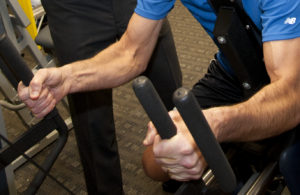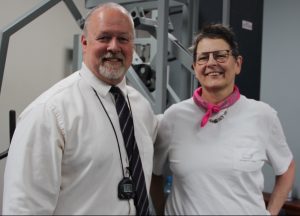Muscle Can Help You Beat Cancer
In the fight against cancer or chronic infections, your immune system must be active over long periods of time. If your battle against cancer or a chronic infection is too long, your immune system can actually become exhausted. A recent study from the German Cancer Research Center found that your muscles can actually keep you in the game by protecting your immune system during chronic infections. Here’s how.
Your immune system produces a special group of white blood cells called T-cells whose job is to kill virus-infected cells or cancer cells. If you encounter a chronic viral infection or you find yourself in a long battle against cancer, your T-cells can literally become “worn out” and lose their full effectiveness to fight cancer or a virus.
 A common side effect of cancer is unexplained weight loss. This often happens due to loss of appetite, fatigue, nausea, or increased metabolism from the cancer itself. This type of cancer-associated weight loss, referred to by doctors as “cachexia,” results in a greater loss of muscle than fat. About 50% of all cancer patients suffer from cachexia.
A common side effect of cancer is unexplained weight loss. This often happens due to loss of appetite, fatigue, nausea, or increased metabolism from the cancer itself. This type of cancer-associated weight loss, referred to by doctors as “cachexia,” results in a greater loss of muscle than fat. About 50% of all cancer patients suffer from cachexia.
An interesting association doctors and researchers have noticed is as cancer patients lose muscle mass, T-cell function decreases. No one has ever really known why the loss of muscle mass affects T-cells, so a group of scientists at the German research center infected mice with a virus and analyzed the gene expression in their skeletal muscles. What they found was absolutely amazing.
It turns out that during chronic infections, muscle cells release an increased amount of a messenger substance called interleukin-15. Interleukin-15 is a type of white blood cell, specifically a cytokine, that signals natural killer cells to attack a virus.
They found that interleukin-15 also caused T-cell precursors to be stored in muscle cells. This process kept a reservoir of T-cell precursors in muscle cells protected from contact with chronic inflammation.
So, if the T-cells, which are actively fighting the infection, lose their functioning through continuous stimulation, the precursor cells can migrate from the muscles and develop into functional T-cells. This enables the immune system to fight a virus or cancer cells continuously over a long period of time.
Let me say this a little more simply. Muscle cells in mice actually stored a reservoir of cancer- and virus-fighting white blood cells. When the active white blood cells became fatigued, fresh white blood cells were released from the muscle cells like a tag team wrestler, well rested and ready for a smack down.
In the study, mice with more muscle mass were better able to cope with chronic viral infections than those with weaker muscles.
For the longest time we’ve thought of muscle as the engine of our body, helping us move and lift heavy objects. Now we are starting to understand that skeletal muscle is a potent regulator of immune system function.
 If you want to keep your immune system strong as you get older, it’s important to keep your muscles strong. It turns out that the more muscle you have, the stronger your immune system can be.
If you want to keep your immune system strong as you get older, it’s important to keep your muscles strong. It turns out that the more muscle you have, the stronger your immune system can be.
Also, if you are battling cancer, it’s extremely important to stay strong. Exercise Inc client Joan O’Conner has been battling breast cancer since 2016. She never misses a workout, and she will quickly tell you that her 20 Minutes A Week keeps her going. Check out her story here.
You need to be strong and have a healthy immune system now more than ever. You can achieve both of those at Exercise Inc in only 20 Minutes A Week. If you’re reading this post and you’re not training with us, please consider scheduling a free appointment right away. We are here to help you.
Stay Strong and Healthy,
Bo Railey

